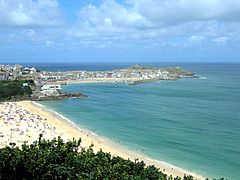St. Ives, Cornwall
St. Ives
|
|
|---|---|
 St Ives Harbour and Porthminster Beach |
|
| St. Ives shown within Cornwall | |
| Population | 11,226 United Kingdom Census 2011 |
| OS grid reference | SW518403 |
| Unitary authority | |
| Ceremonial county | |
| Region | |
| Country | England |
| Sovereign state | United Kingdom |
| Post town | ST. IVES |
| Postcode district | TR26 1/2/3xx |
| Dialling code | 01736 |
| Police | Devon and Cornwall |
| Fire | Cornwall |
| Ambulance | South Western |
| EU Parliament | South West England |
| UK Parliament | |
St Ives (Cornish: Porth Ia, meaning "St Ia's cove") is a seaside town, civil parish and port in Cornwall, England, United Kingdom. The town lies north of Penzance and west of Camborne on the coast of the Celtic Sea. In former times it was commercially dependent on fishing. The decline in fishing, however, caused a shift in commercial emphasis, and the town is now primarily a popular seaside resort, notably achieving the title of Best UK Seaside Town from the British Travel Awards in both 2010 and 2011. St Ives was incorporated by Royal Charter in 1639. St Ives has become renowned for its number of artists. It was named best seaside town of 2007 by The Guardian newspaper. It should not be confused with St Ive, a village and civil parish in southwest Cornwall.
The origin of St Ives is attributed in legend to the arrival of the Irish saint Ia of Cornwall, in the 5th century. The parish church bears her name, and St Ives derives from it.
The Sloop Inn, which lies on the wharf was a fisherman's pub for many centuries and is dated to "circa 1312", making it one of the oldest inns in Cornwall. The town was the site of a particularly notable atrocity during the Prayer Book Rebellion of 1549. The English provost marshal, Anthony Kingston, came to St Ives and invited the portreeve, John Payne, to lunch at an inn. He asked the portreeve to have the gallows erected during the course of the lunch. Afterwards the portreeve and the Provost Marshal walked down to the gallows; the Provost Marshal then ordered the portreeve to mount the gallows. The portreeve was then hanged for being a "busy rebel".
...
Wikipedia

